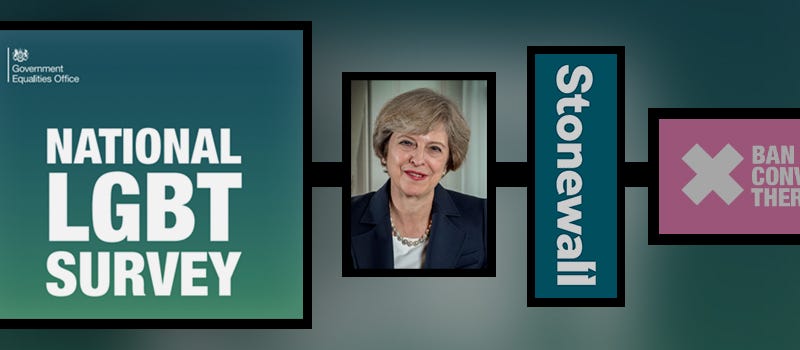The intriguing history of the campaign to ban conversion therapy
Campaign group, Sex Matters, has questioned the thinking behind banning conversion therapy in a report titled ‘Why ban talking therapy?’
The report suggests that prior to a Westminster Government LGBT survey in 2018, almost no one was interested in a ban. What made the change, they say, were the results which claimed that 2% of LGBT people had undergone ‘conversion therapy’, significantly more than even LGBT campaigners had expected.
Further, the report suggests activists didn’t connect gender identity to the ‘conversion therapy’ campaign until much later. They say it “appears to be a direct response to the failure of the campaign for legal self-ID” (the ability to legally change sex at will).
History of the campaign
The history of the campaign to ban conversion therapy is intriguing, to say the least. Those who haven’t followed the claims of activists in recent years will imagine ‘conversion therapy’ includes such horrific actions as electro-shock therapy.
Sadly these abusive practices did take place in the past, including being wrongly carried out on those who struggled with their sexuality. Thankfully they no longer take place in the UK. Abuse and coercion against LGBT people (and anyone else) is illegal and, if such practices occur today, those who carry them out can face the full force of the law.
It is possible that this is why LGBT campaign groups were, as Dr Paul Martin of the LGBT Foundation puts it, “extremely surprised that the national survey raised such a large number of people who had experienced conversion therapy”.
But rather than question the results of the survey, the Government announced it would bring forward legislation to end gay conversion therapy. The promise was enthusiastically endorsed by LGBT activist groups who said their community needed stronger legal protection.
It is now well-known that the survey doesn’t back up what activists claim is taking place in the UK. It hadn’t asked respondents what their ‘conversion therapy’ had looked like, or when or where it had taken place. So the promise of legislation had no meaningful evidence base – no one knew what practices they were legislating for, or whether any of them take place in the UK today.
The idea of legislating for ‘gender identity conversion therapy’ materialised significantly later. Sex Matters points to a comment by Crispin Blunt MP, who linked banning conversion therapy to plans for self-ID being dropped. Sex Matters explains:
“The reason he gave for banning conversion therapy was that ‘trans people are a community under siege’.”
But the eager adoption of policies on ‘trans conversion therapy’ also ignored the need for evidence. Sex Matters explains how in the most recent Westminster Government commissioned study, undertaken by a team at Coventry University: “There was no UK evidence regarding efforts to change gender identity”.
A ban on questioning certain views
So what is it that activists want to be banned? If there is no evidence of the abusive practices that activists say they want to ban, why do they want any new laws in this area? Sex Matters describe it as “a solution in search of a problem”.
Many activists want a law which makes disagreeing with their ideology a criminal offence. They want the law to enshrine ‘affirmation’ of gender identities. They want those who question or have concerns about radical LGBT ideology to be made criminals.
A similar law already exists in Victoria, Australia. Activists in the UK have called it the ‘gold-standard’ conversion therapy ban. Official guidance on the ban there says it is illegal to “not affirm someone’s gender identity”. It says parents who refuse to support their children receiving puberty-blocking drugs are breaking the law. Is that really ‘conversion therapy’?
This is the sort of law activists want for the UK. It is repressive and it is wrong. It is not a law against torture or abuse – it is a law against questioning and disagreeing with certain views on gender and sexuality.
The law in Victoria is also clear that certain religious activity is now illegal. Not just extreme practices like activists would have you believe (often talking about ‘torture’). The practice of ‘prayer’, one of the most obvious expressions of religious freedom, is explicitly mentioned in the ban. The guidance says churches removing membership from those in same-sex relationships is a form of unlawful conversion therapy.
Sex Matters is not a religious organisation, but it recognises the impossibility of legislating in such a religiously-focused way. Describing the personal accounts of ‘conversion therapy’ by activists they are clear: “These are personal stories of spiritual turmoil, not evidence of abusive practices”.


